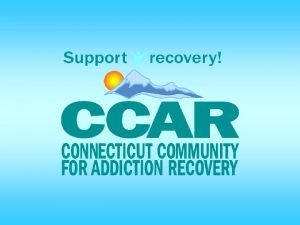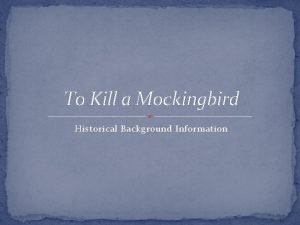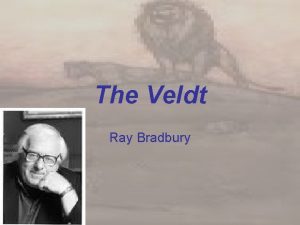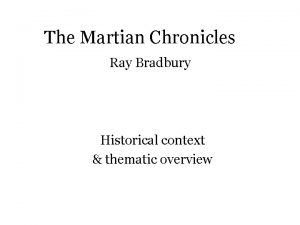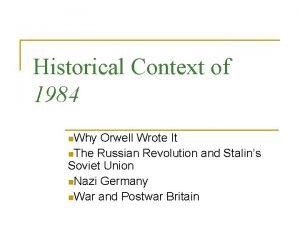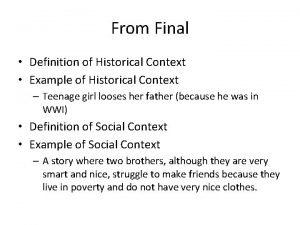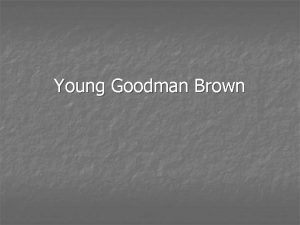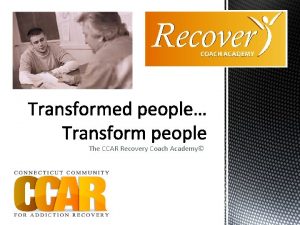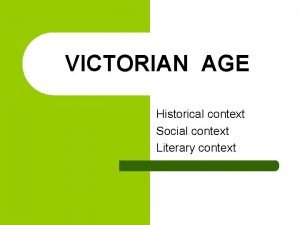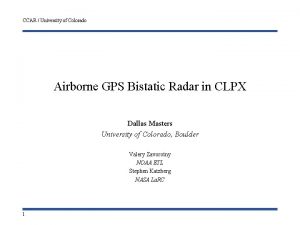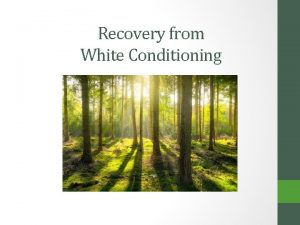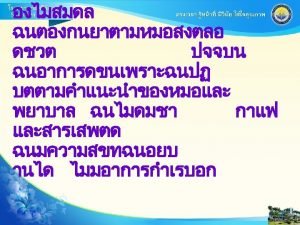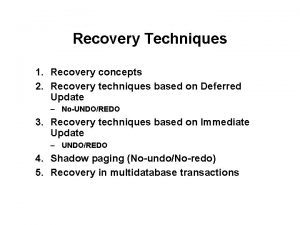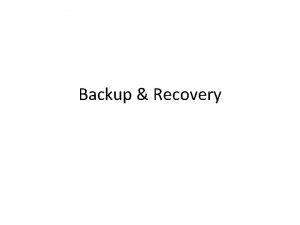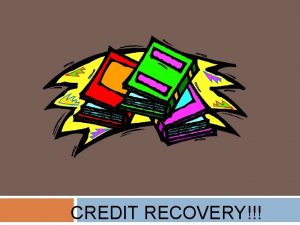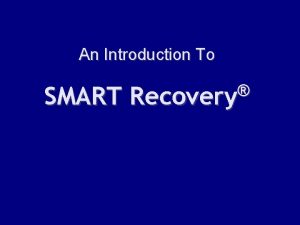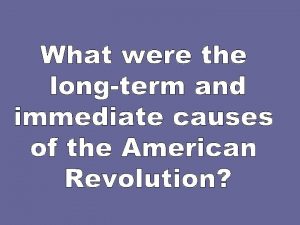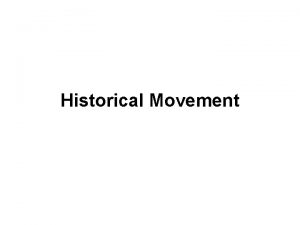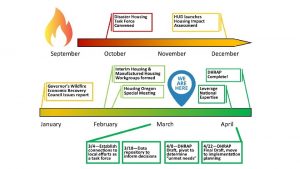Historical context Recovery Community Treatment Community CCAR a



















- Slides: 19


Historical context. . . Recovery Community Treatment Community

CCAR, a Recovery Community Organization… Recovery Community Treatment Community bridges the gap

Recovery Community Organizations will… Recovery Community Single State Agency (SSA) bridge the gap

Connecticut Community for Addiction Recovery (CCAR) Organizes the Recovery Community to… – tap into the inherent nature to give back 1. Put a Face on Recovery – Advocacy: have a voice on issues of importance to the recovery community – Offer ourselves as living proof that recovery is a reality in the lives of millions of people 2. Provide Recovery Support Services – To maintain and sustain recovery Funded by Connecticut DMHAS, HHS/SAMHSA/CSAT/RCSP and private donations

Connecticut Community for Addiction Recovery (CCAR) Some Advocacy Highlights § Wrote the Recovery Core Values along with Advocacy Unlimited that became the foundation for the Commissioner’s Policy # 83: Promoting a Recovery-Oriented Service System § Helped turn “Heroin Town”, a negative Hartford Courant newspaper series, into “Recovery Town” § Educated the legislature about the Pardons Process where significant changes have been made § Assisted DMHAS through some NIMBY housing issues associated with Access to Recovery (ATR) § Involved in FAVOR issues – restoration of RCSP funding, HBO Addiction documentary, insurance discrimination

Connecticut Community for Addiction Recovery (CCAR) Puts a Face on Recovery by – Frequent speaking engagements – Cable public access TV shows • • • Positive Faces, Willimantic Capitol Voices of Recovery, Hartford Hooked on Recovery, New London – DVDs, Videos • • • Putting a Face on Recovery The Healing Power of Recovery The Legacy of Hope: Recovery Elders Video Project – Website http: //ccar. us – Recovery Walks!, Rally for Recovery (FAVOR)

Recovery Community Centers – a recovery oriented sanctuary anchored in the heart of the community – a physical location where CCAR can organize the local recovery community’s ability to care – a place where Recovery Support Services are delivered – services are designed, tailored and delivered by local recovery communities – Volunteer Management System – including people in long-term, sustained recovery

Recovery Community Centers Willimantic, New London, Bridgeport, Hartford

Recovery Support Services • • All-Recovery Groups Recovery Training Series Family Nights Family Support Groups Recovery Coaching Recovery Social Events Telephone Recovery Support* Recovery Housing Project*

Telephone Recovery Support – In the spirit of KISS, a new recoveree would receive a phone call from a trained volunteer (usually another person in recovery) once a week for 12 weeks – Volunteer follows script – Low cost, win/win scenario – CCAR – gives new recoveree a better shot at maintaining their recovery AND helps the Volunteer making the call – Provider – helps their clientele – Prior to discharge, provider offers recoveree the telephone support program. – Results, outcomes, evaluations all outstanding

Telephone Recovery Support • “When asked if I find the TRS (Telephone Recovery Support) calls helpful I can’t say yes enough. There’s something so supportive about knowing that no matter what happens in my life there’s someone who genuinely cares about how my recovery is going. My volunteer has shared in every victory I have had in my recovery since the calls began. I hope to continue receiving these calls for a long time to come. ” ~Constance Carpenter, recoveree enrolled in CCAR’s TRS program for the last 55 weeks

Telephone Recovery Support • “Out of all of the commitments I’ve had – TRS is my favorite way of giving back. Honestly – it’s a toss up as to who gets more out of it…me or them. ” ~Caroline Miclette, TRS Volunteer • “When I was using my phone never rang and I wanted it to. I remember just sitting there, staring at the phone wishing someone would call me, talk to me…possibly help me. Now I’m in recovery, for me this is the perfect way of giving back… being that phone call that I never got. ” ~Curtiss Kolodney, TRS Volunteer

Recovery Housing Project – Inventory existing recovery housing (independently owned, privately operated “sober houses”) • One of a Kind database – Establish the Recovery Housing Coalition of Connecticut • Standards • Advocacy • Monthly meetings – Deliver “So, You Want to Open a Recovery House? ” trainings

Volunteer Management System – Modeled after a hospital volunteer system – Screening, interviews, background checks – Comprehensive Volunteer Orientation training – 6 week, 6 month evaluations – Volunteer Recognition dinner in April

Volunteers Staff

Does CCAR Make A Difference? In 2007… v More than 15, 000 people walked through the doors of our 4 Recovery Community Centers seeking some type of recovery support or assistance v 304 Volunteers contributed more than 10, 000 hours of service v Telephone Recovery Support reached 500 individuals with Volunteers making more than 7, 400 outbound calls v CCAR fielded more than 1, 500 requests for recovery housing beds v CCAR held 70 trainings for 576 participants on topics like the Pardons Process, Understanding Addiction and Recovery, Racism of the Well-Intended, Money management, etc.

Does CCAR Make A Difference? From GPRA data over the last 3 years, after 6 months… – 92. 2% are still drug and alcohol free – 99. 1% have successfully addressed their legal issues and remain crime free – 73. 1% found jobs and/or went back to school – 82. 9% found safe and affordable housing – 99. 4% are reconnected with their family, friends and community – Participants have significantly reduced their health risks for HIV and other drug-related health problems from 77% when they first participated in the program to 55% six months later—reflecting a 22% drop

Contact Information Phillip Valentine Executive Director Connecticut Community for Addiction Recovery (CCAR) 198 Wethersfield Avenue Hartford, CT 06114 (860) 244 -2227 Email: phillip@ccar. us Website: http: //ccar. us
 Ccar willimantic
Ccar willimantic What makes something historically significant
What makes something historically significant Historical context to kill a mockingbird
Historical context to kill a mockingbird What year was the veldt written
What year was the veldt written Ray bradbury historical context
Ray bradbury historical context Romeo and juliet historical context
Romeo and juliet historical context Jane austen historical context
Jane austen historical context Whats going on in
Whats going on in Persepolis historical context
Persepolis historical context Unemployment
Unemployment Fahrenheit 451 intro
Fahrenheit 451 intro Historical context of 1984
Historical context of 1984 Heart of darkness historical context
Heart of darkness historical context Example of historical context
Example of historical context Beowulf historical background
Beowulf historical background Simile in the book thief
Simile in the book thief Hamlet historical context
Hamlet historical context A doll's house cultural context
A doll's house cultural context Historical context of young goodman brown
Historical context of young goodman brown S.e hinton in 1960
S.e hinton in 1960
